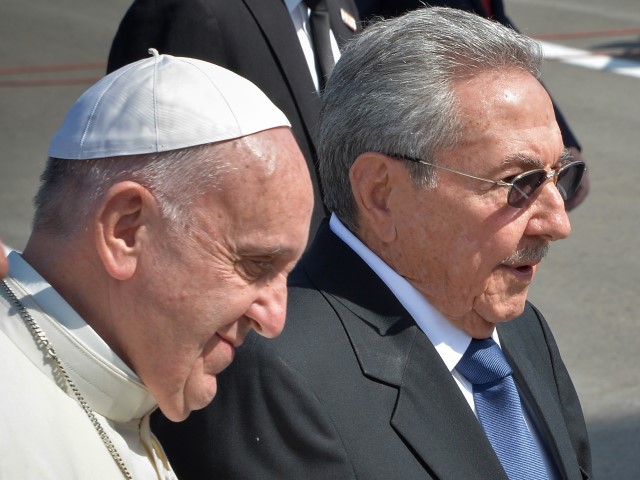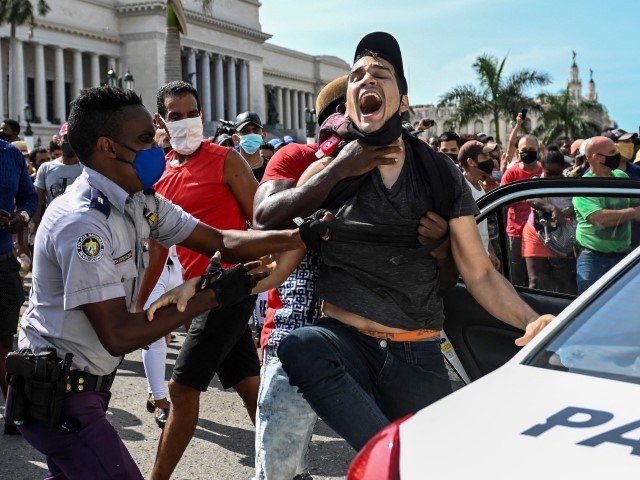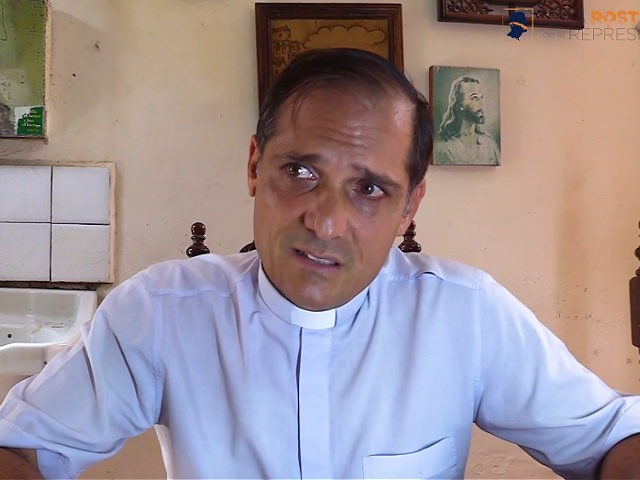Dissident Cuban priest Father Castor José Álvarez Devesa, who was disappeared into the draconian Cuban “legal” system and beaten for days following the nationwide protests on July 11, 2021, is urging Cubans to embrace the social lessons of Jesus as a path to freedom from communism.
Álvarez sat down for an extended interview with the independent outlet Cubanet published on Thursday in which he described his path to ordination, the relationship between the Gospels and anti-communist ideology, and the consequences he has faced in his personal life for openly opposing the Castro regime.
The priest, headquartered in the eastern province of Camagüey, is one of many members of the Catholic Church in Cuba who have taken on a prominent role in organizing and supporting anti-communist dissidence. The Communist Party on the island, as it is in the rest of the world, is an officially atheist entity and violently suppresses all prominent faiths. Late dictator Fidel Castro acted especially violently to silence Christianity, however, forcing Christians – also including Jehovah’s Witnesses and Seventh-Day Adventists – into labor camps alongside suspected gay people, political dissidents, artists, and other “counterrevolutionaries” in the 1960s.
The persecution was largely due to the fact that Christians were among the most vocal opponents of communism even from the early days of the Revolution. Priests participated in the April 17, 1961, attempt by anti-communists to topple Fidel Castro at the Bay of Pigs, which President John F. Kennedy doomed to failure by abandoning his allies. Nuns and deacons have long been staples in counter-revolutionary activity.
Current dictator Raúl Castro has superficially mended fences with the Vatican, even joking to a visiting Pope Francis in 2015 that he could see himself converting to Catholicism. For Catholics in Cuba, however, far from the luxurious quarters of the Holy See, repression and persecution have been the norm for decades, with minimal meaningful Vatican intervention.

Pope Francis is welcomed by Cuban President Raul Castro at the International Airport Jose Marti in Havana, on February 12, 2016. (ADALBERTO ROQUE/AFP via Getty)
“The message of Christ also has an illumination for society, so that we may be happy, so that we can live in peace, justice, and freedom,” Father Álvarez told Cubanet. “I think it is very important to help people understand that the Gospel of Christ can help deliver us from evil also in the fatherland, in society, in the country, in politics, and that influences, if we follow Christ, in a better economy, in the family, in all aspects of society.”
Álvarez said he hoped to “more clearly explain that the Gospel of Christ can illuminate society and bring us much peace and joy.”
The Catholic priest said he has been an opponent of the Communist Party from a young age, stating that he had entered university to study mathematics, but was ultimately sidelined because “university was for revolutionaries.”
“They suspended me indefinitely for … expressing ideas contrary to the ideology of the revolution,” Álvarez recalled. He later entered a seminary after a moment of clarity in which he experienced a calling, he told the Cuban outlet, which required him to end his ongoing relationship with a girlfriend and meditate on the significance of joining the priesthood.
“I think she didn’t have a heart attack because the Virgin lifted up her heart,” Álvarez said, recalling when he told his girlfriend he was interested in the priesthood.
Álvarez was famously among the estimated 187,000 people who took the streets of every major city in Cuba on July 11, 2021, to demand an end to the communist regime. His whereabouts were unknown for nearly a week, and he resurfaced sporting a massive injury on his head. Subsequent reports indicated that communist thugs beat him with a baseball bat.
Álvarez celebrated 20 years in the priesthood that year.
“How can I leave them? Like a father sees his children and says, ‘Well, how can I leave them?'” he told Cubanet on his decision to protest that day. “That resulted in them beating me, injuring me, detaining me at night in a jail cell, then they put a cautionary measure on me prohibiting my exit from the country – in addition [I needed] permission to leave the municipality and [could] leave the house only when necessary.”
“I did not stay home,” he said. “I said, I’m going out, just like when they told Jesus they were looking for him, he said, ‘Tell them I’m going to keep doing my work’ – I kept doing my job.”
Following that incident, which itself followed Álvarez making increasingly combative public statements against communism, he lives in a state of total regime surveillance, he told Cubanet.
“The consequence is living knowing that you are being watched constantly, that there is a persecution that does not allow you all the possibilities that you could have,” he explained. The priest credited the persecution with making him a better priest: “I’ve had to refine myself at the hour of expressing the gospel because you are completely surveilled.”
Far from succeeding, the violent repression on July 11, 2021, has led to an eruption of dissident activity on the island. Human rights groups documented nearly 4,000 anti-communist protests in Cuba in 2022. In 2023, that number was over 5,700.

A man is arrested during a demonstration against the government of Cuban President Miguel Diaz-Canel in Havana, on July 11, 2021. Thousands of Cubans took part in rare protests Sunday against the communist government, marching through a town chanting “Down with the dictatorship” and “We want liberty.” (YAMIL LAGE/AFP via Getty)
Father Álvarez told Cubanet he expects to continue speaking out against the abuses of the communist system.
“We should speak clearly with a mirror to the authorities of Cuba, the truth of what the people are going through and the role that they are playing in shutting down the freedom of the people,” Álvarez said, stating he plans to continue inviting the nation to prayer and explaining the “social doctrine of the Church” that offers a blueprint out of communism.
Follow Frances Martel on Facebook and Twitter.

COMMENTS
Please let us know if you're having issues with commenting.